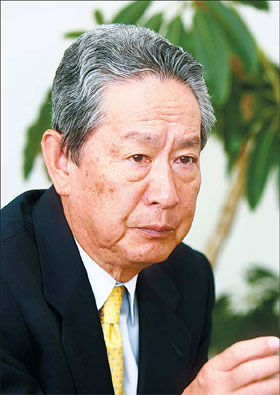Ex-Sony CEO stresses need for global brand
You wouldn't know Nobuyuki Idei is 70 years old if you followed him around for a day.
On a recent Sunday in Sanya, Hainan province, he sat through a daylong business forum, participated in one of the sessions and later attending a party. By the time he finished a two-hour interview with this reporter, it was 11 pm and he finally wound down at the lobby bar, which looked out to a beautiful blue sky joined with the blue sea. Only it had long turned pitch dark.
Suffice it to say, the former CEO of Sony Corporation is busy as ever. He has sat on several boards of Fortune 500 companies, and has his own consulting firm, Quantum Leaps Corporation, which he founded and where he dispenses wisdom accumulated from decades of managing one of Japan's best-known business empires.
If you think about it, Japan has launched two major global brands since WWII: Honda and Sony. Both Toyota and Panasonic are much older, said Idei, who alerted Chinese executives to the difficulty of creating a consumer brand.

"Today's China, like the early days of Japan, depends on exports. But Chinese companies are selling to America without really facing American consumers directly. It is important to make a Chinese brand if you want to be truly global."
Idei elaborated on the challenge of creating international brands. Even in developed nations like the US and Japan, it is hard to build new brands. The fashion industry could be an exception, and new technologies have certainly opened a new vista of possibilities.
"Google does not sell products, it sells experience. It became a global brand in 10 years. And likewise for Amazon, eBay and Yahoo. Baidu has a chance, but it'll be a challenge," he added.
Idei attributed his decision to join the Baidu board as "love at first sight".
"I met Robin Li (Li Yanhong) in Miyazaki and Tokyo unexpectedly and we had dinner. He asked me a lot of questions." Idei said his motivation for joining Baidu was "very different" from that of joining GM years earlier. "I was interested in Baidu's passion for expanding its business, even to Japan. For Robin to go to Japan would be like when I took Sony to the French market. I understood him and wanted to help him."
Idei advised that people not underestimate the difficulty of launching into Japan. He said Baidu would meet enormous difficulties in the first 3-5 years, but if it does not give up, it'll have a higher chance of success.
As he illustrated, Sony stayed on after acquiring Columbia Pictures and finally turned it around. People will ask: how can the Chinese manage a Japanese company? Baidu will have no protection like the kind it enjoys in its home market. The key is to "find the right person for the right position".
Idei wouldn't speculate how much market share Baidu could snatch in the Japanese market, but as a corporate board member, he would oversee the operation and give "a lot of valuable suggestions to Robin" and help him build a network of talents through his business friends. "Almost all the Chinese companies have the potential of success in foreign markets," he said, adding, "the most important thing is a strong commitment."
However, Idei cautioned that the decision to enter the Japanese market should be partly determined by what one sells. If you want to sell "hardware" in Japan, it is "impossible" even if your product is better and price is cheaper. That's because you'll have to offer a guarantee of more than 10 years. If you want to sell automobiles, it'll be "very difficult" because it is an established market and does not easily accommodate a new brand. But if you want to offer an IT service, it is possible because you can provide the service from Beijing.
When talking about his legacy at Sony, a company that he thought about leaving three times, Idei said: "The CEO has the vision for the whole company." He recalled the first time he met with Bill Gates and other IT bigwigs back when they were in their 20s. "We didn't have much interest because it didn't fit into Sony's culture." But when he became president in 1995, he steered toward this direction by adding an information technology business to the company. He hitched up with Andy Grove of Intel and decided to launch into the computer business. "It was called the GI Project, short for Grove and Idei, which is well known in both Intel and Sony."
Idei's second project was code named "Palace Project" because it was hatched in Beijing's Palace Hotel. His rationale was: China has 10 times the population of Japan. Though there was plenty of doubt about the feasibility of entering China, he had a hunch that someday Sony could generate more revenue in China than in Japan.
Idei's third legacy is the improvement of corporate governance through an independent board. "We need people who can tell the CEO that he is wrong and be candid like in a family." But board members in Japanese companies used to rise up through the corporate ladder and were not in a position to provide a third opinion. By splitting the board into two components, the power between managers who execute and board members who oversee is more balanced. Idei also drastically reduced the number of members. After Sony's reform, nearly 2,000 Japanese companies followed suit, and a new corporate culture was born in the country.
Although Nobuyuki Idei keeps a busy schedule, he does not consider himself a workaholic. "I enjoy my work. I have a lot of friends. Movies are my hobby. I'm writing every month and have published two books." He said there's only so much money can buy for you, like a personal jet at the maximum. "What I have interest in, is to contribute to something."
(China Daily 01/25/2008 page15)














